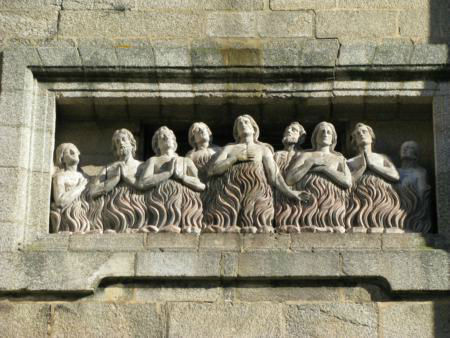Holy days of obligation / Praying from purgatory
This column is part of the CNS columns package.
Q. When are we going to do away with holy days of obligation? We no longer live in medieval times when a whole village is closed down for the day. The only people at Mass now are the true die-hards. Please encourage the bishops to put the celebrations on Sunday or take away the obligation. (Copake, New York)
A. In the Catholic world, there is considerable variation from country to country in the number of holy days of obligation (when Catholics are required to participate in the Eucharist). The Code of Canon Law in No. 1246 lists 10 of these, in addition to Sundays, but allows national conferences of bishops to reduce the number or to transfer their observance to a Sunday.
Vatican City observes all 10, while Canada keeps only two (Christmas and Jan. 1).
The United States has kept six holy days of obligation: the feast of Mary, Mother of God (Jan. 1); Ascension Thursday (40 days after Easter); the Assumption of Our Lady (Aug.15); All Saints' Day (Nov. 1); the Immaculate Conception (Dec. 8); and Christmas (Dec. 25.)
The U.S. Conference of Bishops of the United States decided to maintain the traditional six holy days. Later, in 1999, ecclesiastical provinces of the country were permitted to transfer the observance of the feast of the Ascension to the following Sunday, and most of the United States has done that.
The most confusing aspect, I believe, was the determination of the U.S. bishops' conference that whenever Jan. 1, Aug. 15 or Nov. 1 falls on a Saturday or a Monday, the obligation to attend Mass is removed. As a pastor, I confess that each time this happens I feel the need to review the regulation and explain it in our parish bulletin, because neither our parishioners nor I can seem to keep it straight.
Regretfully, I acknowledge your contention that Mass attendance is low on some of these holy days. In the fourth century, St. John Chrysostom lamented in a homily that "many people celebrate the holy days and know their names; but of their history, meaning and origin, they know nothing." If we are to maintain the six holy days of obligation for the United States, we probably need to do a better job explaining their meaning and their importance.
Q. If I recall correctly from grade school (60 years ago), the poor souls in purgatory cannot pray for themselves, but they are able to pray for those still in the world. I have been asked on a number of occasions to say a few words at a funeral in honor of the deceased. Each time, I am moved to close my reflection with, "Pray for us, (name of the deceased), now and at the hour of our death." Am I off-base? (Wauwatosa, Wisconsin)
A. Whether the souls in purgatory can, by their prayers, help those still on earth is an unsettled question in Catholic theology and a matter on which renowned theologians have differed. Thomas Aquinas held quite definitively that the poor souls could not help us, while Robert Bellarmine and Alphonsus Liguori believed that they could.
The section in The Catechism of the Catholic Church that deals with purgatory (No.1030-1032) makes no mention of the holy souls praying for us, and at no point does the liturgy of the church invoke their help.
But we cannot exclude that possibility; it could be that praying for the living is part of their purification in readying themselves for the holiness of heaven. So, I see no harm in asking for their prayers. If they are in purgatory, they might be able to pray for us; if they are already in heaven, they certainly can.
---
Questions may be sent to Father Kenneth Doyle at askfatherdoyle@gmail.com and 40 Hopewell St., Albany, N.Y. 12208.
- Father Kenneth Doyle is a columnist for Catholic News Service



















